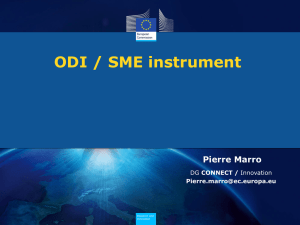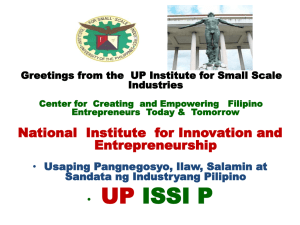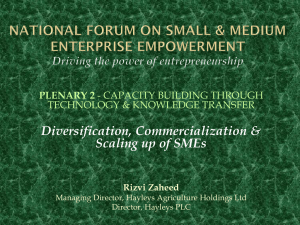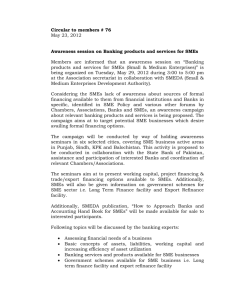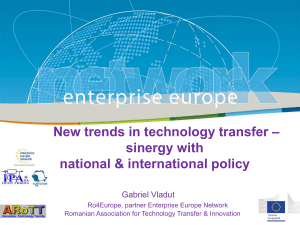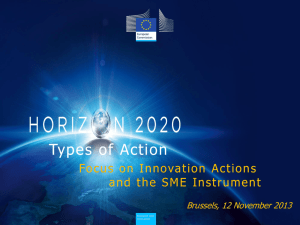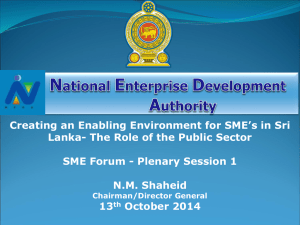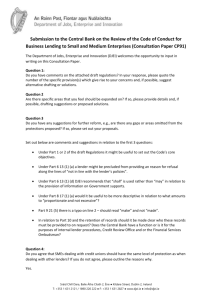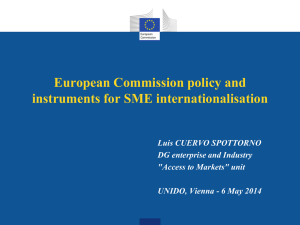Sean Burke – EI
advertisement
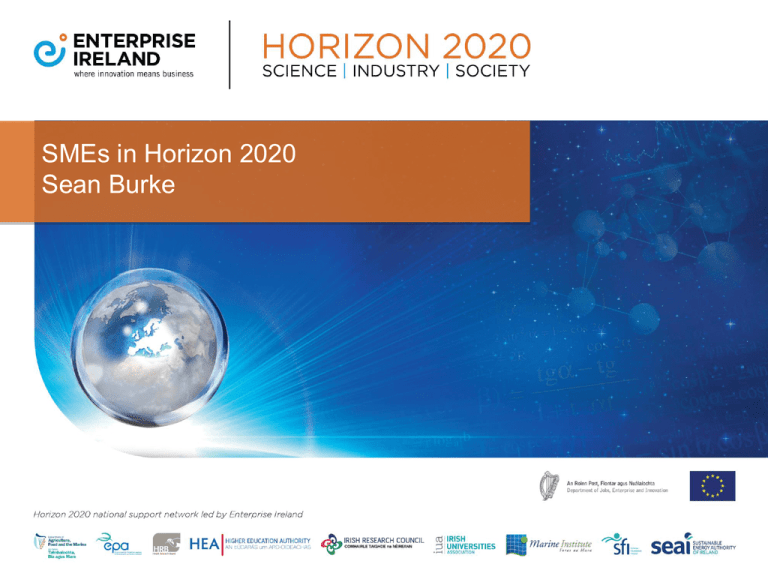
SMEs in Horizon 2020 Sean Burke Agenda 1. The SME Instrument 2. Fast Track to Innovation (January 2015) 3. Supports for Companies applying for H2020 Funding The SME Instrument SMEs in Horizon 2020 Main Features • Targeted at all types of innovative SMEs showing a strong ambition to develop, grow and internationalise • Only SMEs will be allowed to apply for funding and support • Single company support possible • No obligation for applicants to sequentially cover all three phases; each phase open to all SMEs • 70% funding (exceptions possible) The SME instrument is not an R&D programme. It is an accelerator for market introduction of promising technological or non-technological innovations. While the scheme does not exclude R&D activities, the purpose is not on knowledge development, but on developing a convincing commercial proposition. Breakdown of Phase Activity Phase 1 and 2 Applications Submittal period: SME Instrument Project applications for both Phase 1 and Phase 2 funding can be submitted anytime during the year. The evaluations of project applications are conducted at predefined times during the year. Business opportunity • At the end of Phase 2, participating companies should have developed a NEW Innovation led idea (product, process, service) that can be deployed and launched on the market. • The business innovation plan III to be developed by the end of Phase 2 will contain a detailed marketing and commercialisation strategy and a financing plan describing how private investment will be used Fast Track to Innovation The FAST TRACK To INNOVATION pilot (opened January 2015) supports projects undertaking innovation from the demonstration stage through to market uptake 1. It covers • • • • piloting, test-beds, validation in real world/working conditions, pre-normative research and standard-setting 2. It targets • relatively mature new technologies, concepts, processes and business models that need a last development step to reach the market and wider deployment A minimum of 3 and a maximum of 5 legal entities can participate in an FTI project. At least one of the following minimum conditions shall be met: either o at least 60% of the overall budget of the proposal must be allocated to consortium partner(s) from industry Or the minimum number of industry participants must be 2 in a consortium of 3 or 4 partners, and 3 in a consortium of 5 partners. The maximum EU contribution per project is EUR 3 million. Proposals shall relate to the specific objective 'Leadership in enabling and industrial technologies' and/or to any of the specific objectives under the priority 'Societal challenges'. A proposal must include a business plan. For this pilot phase of the FTI, only applications involving entities all of whom must be established in the EU Member States or countries associated to Horizon 2020 are eligible. Implementation and Planning • Cut-off dates: 29/4/2015 1/9/2015 1/12/2015 Impact: 4 out of 5 – overall score 12 out of 15 Proposals will be reviewed on an on-going basis TRL 6 Support For Companies • • • Innovation Vouchers New Pilot Scheme from 1 September 2014 for 6 months 5,000 euro Eligible activities include: • Analysis of how similar companies have benefited from participation in collaborative R&D programmes such as Framework Programme 7 • Proposal preparation • Partner search and due diligence Link: http://www.enterprise-ireland.com/en/Research-Innovation/Companies/Collaborate-with-companies-researchinstitutes/Innovation-Voucher.shortcut.html • • Companies that have participated in European Framework Programme (FP7) projects are not eligible to apply for an Innovation Voucher. Companies can only apply for one of these standard €5,000 vouchers during the pilot call. Utilize Nimbus/TFI as a turnkey offering – contact Roy Donnelly (roy.donnelly@cit.ie ) Meet the Experts www.horizon2020.ie Contact: Sean Burke, EI Shannon t: 00353 61-777 048 e: Sean.Burke@enterprise-ireland.com Jill Leonard, EI Dublin t: 00353 1-727 2751 e: jill.leonard@enterprise-ireland.com www.horizon2020.ie


